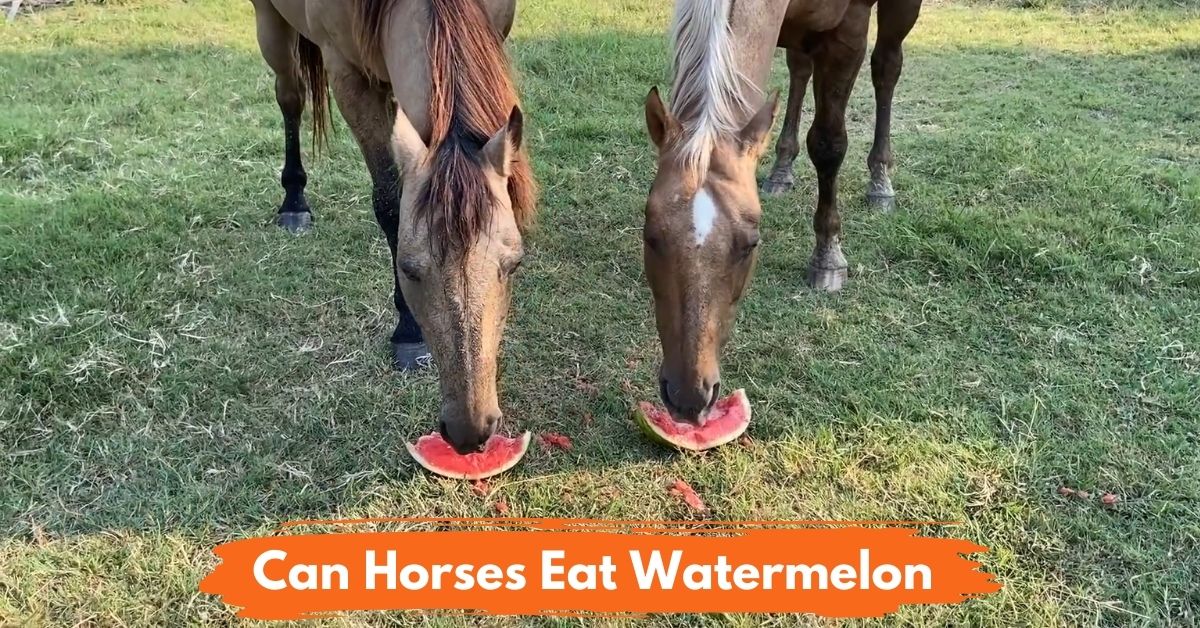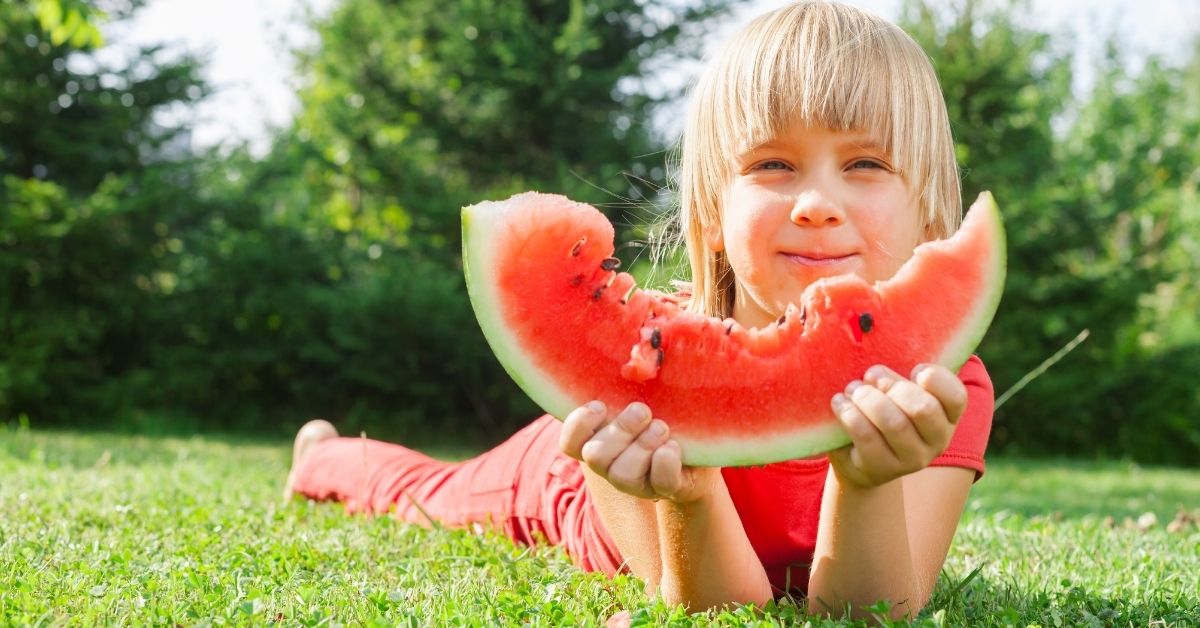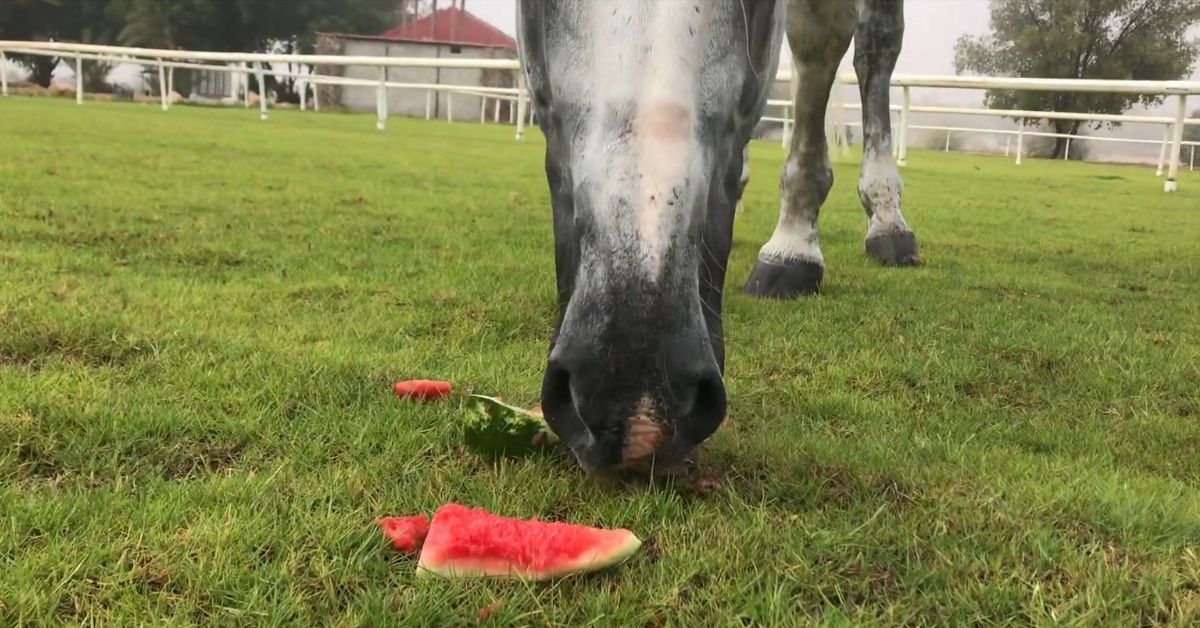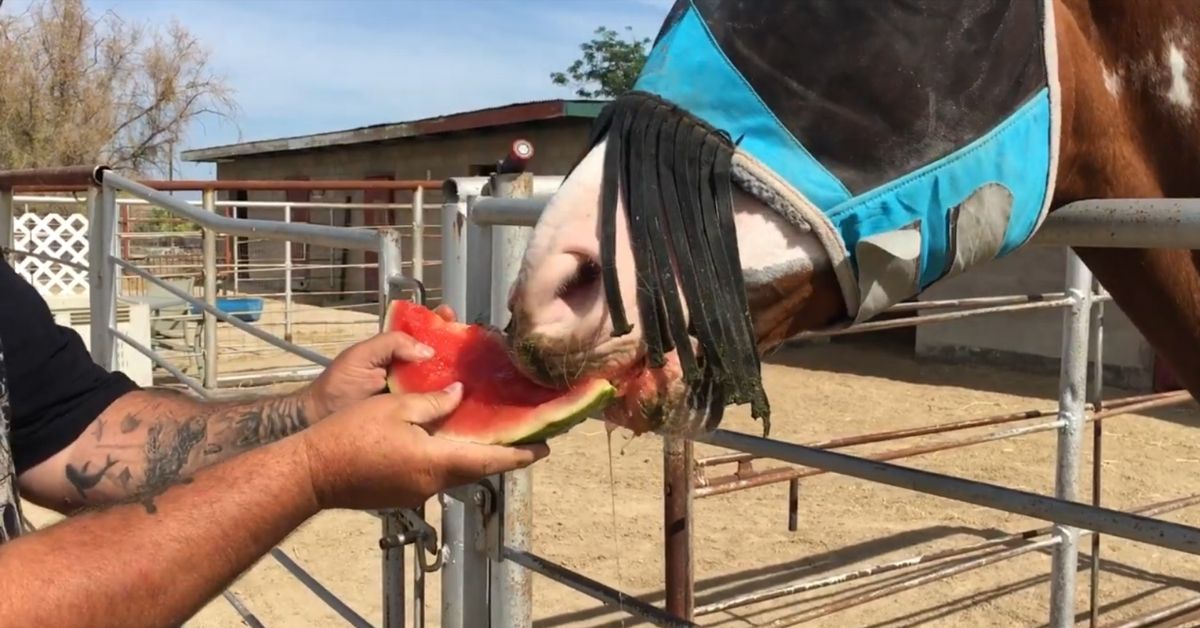
Horses can eat watermelon because of its refreshing taste and health benefits. Your horses will enjoy this healthy treat for sure!
I’ve visited several ranches and I found out that they serve watermelon to their horses all year round. I followed what they do and my horses also love it! It’s a treat that helps them cool down during the summer days but they can have it any time of the year.
Grain, grass, and hay are the main components of the horse’s diet. These are enough to meet the nutrients that a horse needs. But giving a treat to horses like watermelon is also good. This fruit has nutritional value but it’s not the ultimate treat for equines.
Some situations will stop you from giving your horses watermelon. To ensure that you don’t make any mistakes, read this article. You’ll find everything that you need to know about feeding horses watermelon.
Is Watermelon Healthy For Horses?
The good news is that horses can consume the whole watermelon. It means that they don’t only like the red, juicy flesh but the rind and seeds as well. It’s great as the whole fruit can deliver health benefits.
Free of Fat and Cholesterol
A hundred grams of watermelon only contains 30 calories and is void of fat and cholesterol. Moreover, it’s 92% water which helps them cool down during summer days. Still, you need to give your horses water.
Packed with Vitamins and Minerals
Watermelon has Vitamin C which is an antioxidant and a booster of the immune system. It’s also a provider of Vitamin A which is good for the immune system, bone health, and eyesight. The Vitamin B6 in watermelon can convert carbohydrates and fats into usable energy.
Furthermore, it contains calcium that regulates enzymes, blood clotting, and muscle contraction. It’s also known to strengthen the bones, teeth, and hooves of horses. Phosphorus is another nutrient from watermelon. It gives the same benefits as calcium but it has the role of transferring energy.
Iron is also found in the watermelon and it benefits horses in many ways. It distributes oxygen to the different body parts of a horse. Due to its presence, horses can have a better immune system. This nutrient speeds up energy production while improving digestion.
Magnesium is also found in watermelon. It has anti-inflammatory properties that have a positive impact on the health of a horse. They promote the proper function of muscles and nerves. Magnesium lowers depression among horses and it decreases insulin resistance too.
Amino Acids, Fiber, and Potassium From Watermelon Rind

Both the watermelon flesh and rind can provide the same minerals and vitamins. But, watermelon rind abounds with these health benefits.
Amino Acid
Citrulline is an amino acid that you can find in watermelon. This becomes arginine when it gets inside the body of the horse. Arginine can pacify blood vessels inside a horse’s body since it gives off nitrite oxide. This effect leads to the improvement of blood flow in various body parts.
Arginine can lower blood pressure too. It assists muscle growth, heals wounds, eliminates fatigue, and improves the immune system.
Lycopene is another amino acid that is present in watermelon. But there’s a different amount of lycopene among red watermelons in a study. Variations take place because of cultivar and fruit characteristics like hybrid and seedless.
Fiber
The daily meal of horses is 50% fiber which becomes energy when processed in the gut. Fiber is vital in a horse’s system as it lets the food particles travel in the digestive system.
Without fiber, horses will suffer from colic, dehydration, and laminitis. They can get the necessary fiber from grains and hay that they eat every day. Due to the contribution of fiber to a horse’s well-being, it has a similar value to sleeping and walking.
The fiber that a horse gets from its main diet is enough for a horse that doesn’t work hard. But horses that train need to have supplements like grain feed.
This feed has a higher amount of sugar and fat for the much-needed energy used in training. Hence, the fiber in watermelon rinds will give more energy to the horse.
Potassium
This is essential for a horse’s physiological aspect. Potassium is in horses’ primary food sources which are grass, hay, and forage. But they lose it when they pee and sweat.
Losing potassium is detrimental among horses, especially when they sweat a lot. Potassium deficiency can also happen when there’s low forage. This can cause a horse to feel fatigued with weak muscles and deteriorating appetite.
Watermelon rinds can increase the potassium intake of horses. Other options to counter potassium deficiency are fresh grass and equine electrolytes.
Benefits of Watermelon Seeds
The Pennsylvania State University recognizes the health benefits of watermelon seeds. Good fats are in a cup of watermelon seeds. Omega-6 fatty acids, monounsaturated fats, and polyunsaturated fats are present! These seeds are a great source of protein too.
Watermelon seeds have similar content with the flesh and rind. They have Vitamin B and minerals like potassium, phosphorus, magnesium, iron, and sodium. Watermelon seeds contain cyanide, a poisonous substance.
A high amount of cyanide is harmful to horses. If a horse eats seeds together with the flesh, there’s nothing to worry about. So, it’s not advisable to feed horses with only watermelon seeds.
Can All Horses Enjoy Eating Watermelons?

It’s undeniable that watermelon fruit offers many health benefits. But, can all horses enjoy eating watermelons? Sad to say, some conditions will prevent you from giving watermelons as a treat to your horses. They are as follows.
Insulin-resistant Condition
Due to the sugar content in watermelons, it’s not good for insulin-resistant horses. This condition may come from Equine Cushing’s disease, equine metabolic system, and pituitary pars intermedia dysfunction.
There’s no cure for equine Cushing’s disease. So, weight management among affected horses is a must. Sugar from watermelon has nothing to do to maintain the ideal weight of a horse.
Hyperkalemic Periodic Paralysis (HYPP)
A horse with this condition must cut its potassium intake. Be wary as watermelon has a potassium content. Although the amount is not plentiful, don’t give this fruit to the horses. It’s to ensure nothing bad will happen to them.
Dental Issues
Some older horses have dental issues so it’s difficult to chew the watermelon rind. In this case, you may only give them the flesh. Older horses can eat this fruit as long as they have healthy teeth. It’s important to break the food into pieces before entering the digestive system.
FAQs
Is There a Lot of Sugar in Watermelons?
A cup of watermelon has 9.42 grams of natural sugar. This information is from According to the University of Rochester Medical Center. It’s a fair amount as this substance is also found in the grass that horses eat. A hundred grams of grass has 15 to 25 grams of sugar.
How Much Watermelon Can a Horse Eat?
The watermelon that you feed your horse should be in moderation. Remember that watermelon is only a treat for horses. Thus, it should only have a small part in a horse’s diet. Excessive intake puts the animal at risk of digestive issues and gastric problems.
You can give a small amount of watermelon first and observe for adverse effects. If your horse loves it, you can give it to them as a treat.
How Often Should You Feed Watermelon to Your Horse?

You don’t have to feed watermelon to your horse daily. A few times a week is acceptable as horses don’t need a lot of this fruit’s sugar content.
How Do You Cut Watermelon For a Horse?
There are different ways you can cut watermelon before serving it to your horse. You can chop both the watermelon flesh and rind. But it’s best to separate the flesh from the rind, especially if some horses can only handle soft treats. When making a frozen treat, chopping is the right way to prepare the fruit.
Horses can consume big chunks of watermelon mixed with other fruits and vegetables. You can serve this assorted treat chilled or at room temperature.
You may also chop watermelons into small pieces if your horses are not used to big chunks. It’s a way to prevent them from choking. This is advisable if you take care of fast eaters.
Can Horses Be Allergic to Watermelon?
Horses are not allergic to watermelon. Prof. Laurent Couëtil of Purdue University discovered that horses have fall allergies. That’s why you can notice that horses cough or struggle breathing during harvest season. These are the symptoms of equine asthma.
Still, you have to wash the watermelon as the plant might have gotten in contact with a pesticide. The National Pesticide Information Center found permethrin in plants like watermelon. Permethrin is an insecticide to keep pests away from plants.
.
The effects of permethrin can vary as it depends on the level of exposure. Animals exposed to permethrin make strange movements. For example, they roll on the ground or twitch their ears. It can get worse as they can have seizures. Exposure to a high amount of permethrin can lead to death.
Even though horses are not allergic to watermelon, you have to wash it well. Do the same thing with other fruits and vegetables that you include in a horse’s diet. You have to make sure that the foods that you feed your horses are safe.
Can Horses Eat Watermelon Seeds?
Horses eat watermelon seeds together with the flesh. Since these seeds contain cyanide like other seeds, you don’t have to feed them to your horses. When animals chew seeds, the poisonous cyanide comes out.
You can’t be sure of what amount of cyanide can harm or kill a horse. To be safe, don’t feed your horses with watermelon seeds and seeds from other fruits.
Can Horses Eat Watermelon Rind?
Horses can eat watermelon rind and it’s even a common horse treat in Europe. It’s also a healthy treat since it has a high amount of potassium, fiber, and amino acids. It has phosphorus, iron, magnesium, and Vitamins A, B6, and C too.
How Much Watermelon Rind Can a Horse Eat?
A horse should only eat two cups of watermelon rind a day. It can be a treat a few times a week.
Conclusion
Horses can eat watermelon including the rind and seeds. It’s a refreshing and healthy treat. Wash and cut it into the right size before serving your horses. Make sure that they’re safe from choking and pesticide intoxication.
Horses can have watermelon treats from time to time. You have to avoid giving this fruit to those that have dental issues. It’s not also helpful for horses with conditions that limit sugar and potassium intake.
